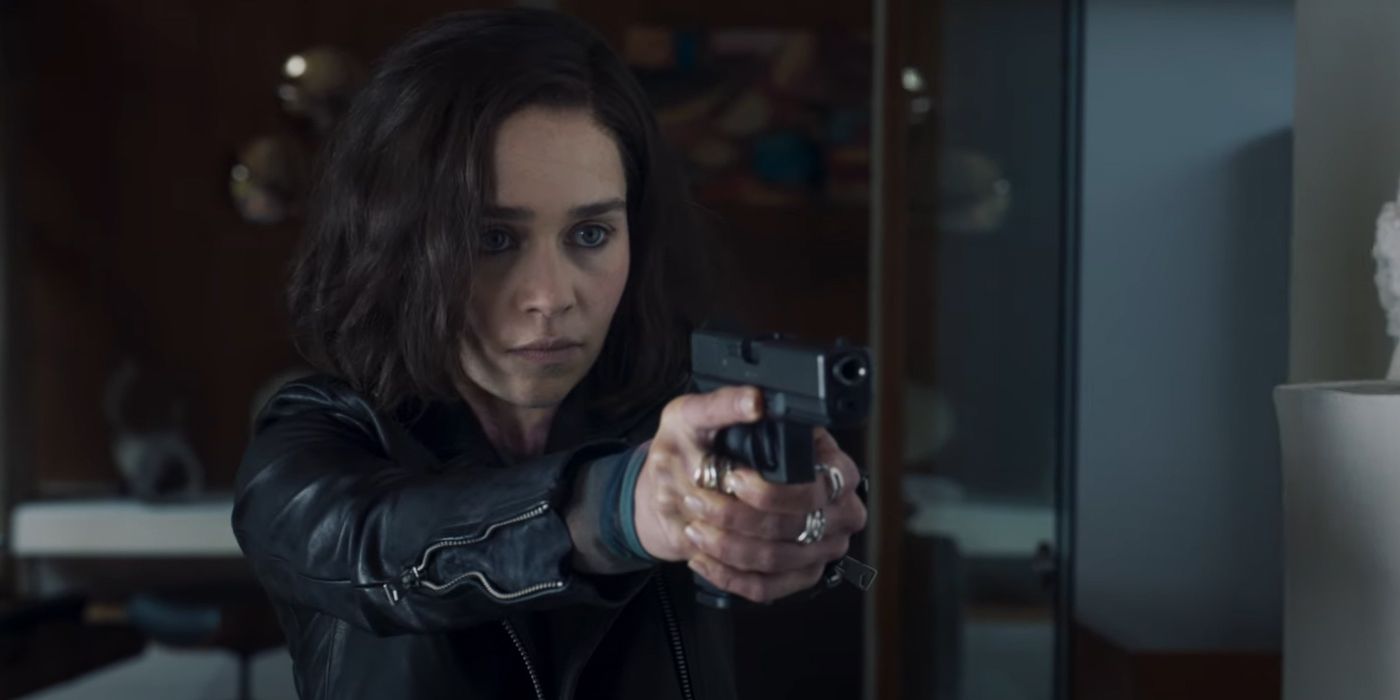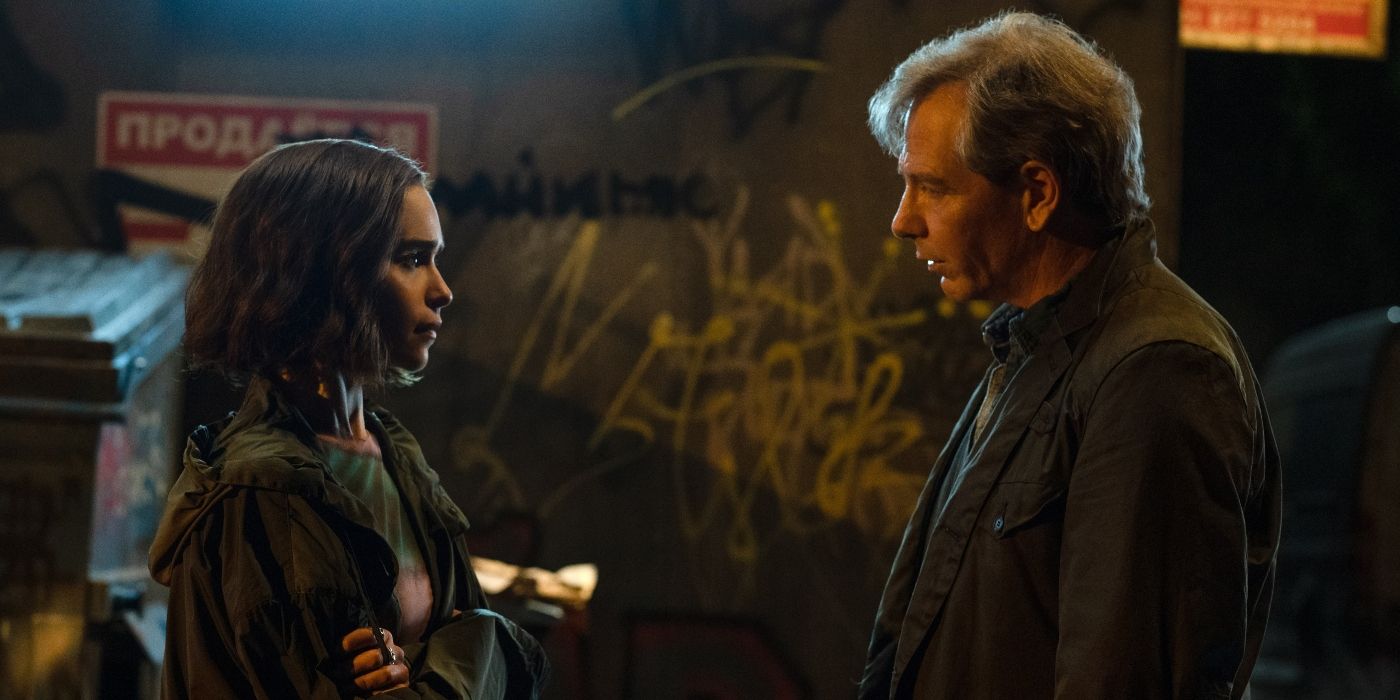Editor’s note: The below contains spoilers for the first two episodes of Secret Invasion.
One of the big questions that have emerged over the first two episodes of Marvel’s Secret Invasion is what side of the main conflict G’iah (Emilia Clarke) will end up on. Talos’ (Ben Mendelsohn) estranged daughter is currently working for the Skrull resistance but is losing faith in the organization, especially its leader Gravik (Kingsley Ben-Adir), because of their violent methods. She has already attempted to help her father and Nick Fury (Samuel L. Jackson) stop a resistance attack, but the series leaves it up to the viewer to determine whether this actually makes up for the crimes she’s already been involved in and the mysterious nature of the series means that a lot of details that would clarify the character’s moral alignment are still unknown. A bigger question emerges: is G’iah already beyond redemption, regardless of whether she ultimately decides she wants it?
In the series premiere, G’iah is introduced while welcoming a Skrull refugee named Beto (Samuel Adewunmi) to the Skrull community of New Skrullos. She is then instructed to pick up two bags from a bomb maker named Poprishchin (Uriel Emil) and deliver them to the resistance’s Moscow safe house, which she does. However, after a tense reunion with her father, G’iah eventually tells him that she will mark the three bombs she received with infrared spray so that he and Fury can track and apprehend the bombers before the attack is carried out. Unfortunately, the three bags turn out to be decoys and Gravik successfully triggers the bombs in the middle of a Russian Unity Day celebration.
G’iah Is a Reluctant Villain in the MCU
In the second episode, G’iah is visibly shaken by the devastation of the bombing but flees with Gravik. She begins investigating his secret project, which involves experimentation involving the DNA of alien and super-powered beings like Groot (Vin Diesel) and the Extremis soldiers from Iron Man 3. When Gravik and his forces launch an attack to rescue a Skrull warrior named Brogan (Ben Peel) from Sonya Falsworth (Olivia Colman) G’iah is shown outside making a phone call in Russian. Afterward, authorities arrive at the safe house, suggesting that she tipped them off to its location. However, Brogan is blamed for this, and Gravik’s right-hand, Pagon (Killian Scott), takes him into the woods and kills him, visibly upsetting G’iah. Although her efforts at sabotaging the organization are admirable, allowing someone else to take the fall and die for them is hardly praiseworthy.
This also highlights a potential problem with the series’ plotting. G’iah’s current position as essentially a double agent is helpful to the series, as it provides a way for the viewer to learn more about Gravik’s plans without turning him into a more standard, monologuing super-villain, and the doubts about her true loyalties are an important example of how the series explores themes related to trust. However, the longer she goes without taking a direct stand against Gravik, the harder her possible redemption becomes to accept as she becomes a party to more and more atrocities, no matter how upset they make her.
The Marvel Cinematic Universe has established some unspoken rules about when characters can and can’t be forgiven for past crimes, and they have a lot to do with how much knowledge and control of a situation someone has when they do something bad. Bucky Barnes (Sebastian Stan) was so thoroughly brainwashed by Hydra that he truly could not stop himself from acting as their assassin, the Winter Soldier. Older Black Widows like Natasha Romanoff (Scarlett Johansson) and Melina Vostokoff (Rachel Weisz) were psychologically manipulated into serving as the Red Room’s killer agents while younger ones like Yelena Belova (Florence Pugh) were subjected to chemical mind control, making them physically incapable of defying Dreykov’s (Ray Winstone) orders. When Yelena was freed from this control, she didn’t even seem to remember her recent actions. The fact that these characters still feel guilt over what they did at these points in their lives, despite not having true control over their actions, emphasizes that they are fundamentally good people.
On the other hand, characters like Loki (Tom Hiddleston) and Baron Zemo (Daniel Brühl) consciously chose to harm and/or kill others of their own free will. This makes them villains, no matter how sympathetic their backstories may render them, and calls into question the relative value of even their later, more heroic actions. The original timeline’s Loki helped rescue the people of Asgard from Hela (Cate Blanchett) and sacrificed his life to protect his brother Thor (Chris Hemsworth) from Thanos (Josh Brolin), while the variant version from the Loki TV series was last seen attempting to protect the world from an invasion of Kang (Jonathan Majors) variants. But does any of this really make up for his actions as a murderous conqueror in Thor and The Avengers? The films and series don’t necessarily argue that it does. Likewise, Zemo may express regret for killing T’Challa/Black Panther’s (Chadwick Boseman) father T’Chaka (John Kani) but in The Falcon and the Winter Soldier he remains adamant that his mission to rid the world of super-soldiers justifies his actions, keeping him a firmly villainous character, despite how charming the series’ writing and Brühl’s performance made him.
Is G’iah an Anti-Hero or a Secret Hero?
Given this franchise ideology, and the fact that there is no evidence that G’iah’s ability to control her actions has been taken away, the determining factor in whether she can really be redeemed will be what she knew and when she knew it. Specifically, the series needs to clarify whether she knew the bags she marked were decoys. After the bombing, she asks Gravik how he knew Fury would be there (although he claims he didn’t know for certain), which implies that there were likely more aspects of the plan she wasn’t aware of, but this needs to be confirmed before the character can honestly be portrayed as heroic. If she did know about the decoys, any later material attempting to redeem her will become irrelevant, as she would be complicit not just in the deaths that directly resulted from the bomb blasts but also that of Maria Hill (Cobie Smulders), who Gravik killed amidst the chaos.
Another factor complicating G’iah’s potential redemption is that so far she is somewhat selfishly motivated. Her decision to mark the bombs doesn’t come until after Talos tells her that the resistance killed her mother. This makes her decision to begin sabotaging the group more believable, but it also makes it decidedly less admirable. If the creators ultimately want her to be a heroic character, she needs to eventually go against Gravik because it is the right thing to do, not just because she personally wants revenge on him.
It’s perfectly fine if Secret Invasion keeps G’iah as either an anti-hero or a sympathetic villain. People love those kinds of characters, as shown by Loki and Zemo’s respective popularity — and including one in a spy series that is all about trust, or the lack of it, makes sense. But the first two episodes make it seem like the character is eventually supposed to be considered a hero. If that does wind up being the case, the series needs to tread carefully and replace some of her moral ambiguity with moral clarity.
New episodes of Secret Invasion premiere every Wednesday on Disney+.
Stay connected with us on social media platform for instant update click here to join our Twitter, & Facebook
We are now on Telegram. Click here to join our channel (@TechiUpdate) and stay updated with the latest Technology headlines.
For all the latest TV News Click Here


